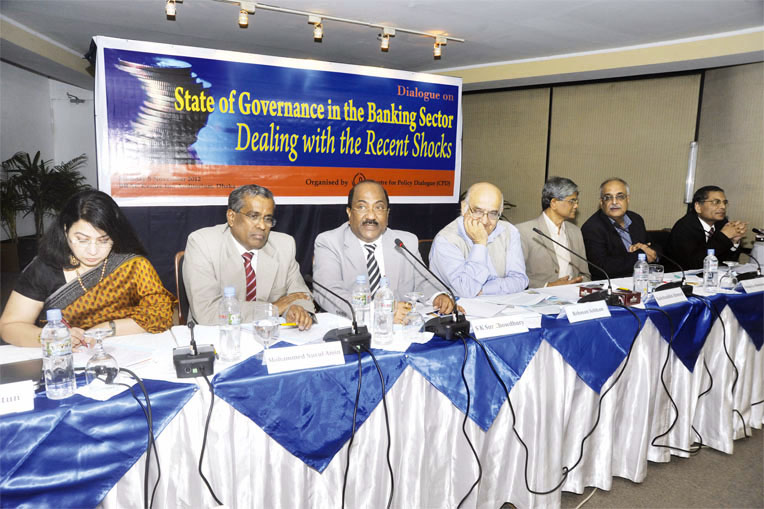The recently detected case widely known as the ‘Hall-Mark case’ of forgery through inland bills trade involving the largest commercial bank of the country, Sonali Bank Limited (SBL) testified poor bank management, weak internal control and improper risk management. The swindle also testified total lack of governance on the part of SBL by utterly violating the Single Party Exposure Limit set by the Bangladesh Bank for the banks. Dr Fahmida Khatun, Head of Research, CPD viewed such as the keynote speaker in a dialogue on State of Governance in the Banking Sector: Dealing with the Recent Shocks, organised by CPD at the BRAC Centre Inn, Dhaka on 5 November 2012. The session was chaired by Professor Rehman Sobhan, Chairman, CPD where Mr S K Sur Chowdhury, Deputy Governor, Bangladesh Bank; Dr Salehuddin Ahmed, Former Governor, Bangladesh Bank; Mr Mohammed Nurul Amin, Managing Director & CEO, NCC Bank Limited and Chairman, Association of Bankers, Bangladesh Limited participated as panelists.
Speakers at the dialogue highlighted the urgency for strengthening the risk management policy, making the board of directors free from political influence, providing more autonomy to the central bank, and demanded exemplary punishment to the persons responsible for the scam and to take measures to recover the embezzled fund immediately.
In her keynote, Dr Khatun presented the anatomy of the most despicable case of forgery in the banking history of Bangladesh. She has pointed out several unauthorised ways of misappropriating a fund amounting Tk. 3,606.48 crore which is 237 per cent of the paid up capital of the bank. Serious irregularities were found in the same branch of SBL in 2010 related to international trade, though no steps were taken, she informed. Dr Khatun identified a number of reasons behind the forgery including pressure exerted by powerful sections, corrupted alliance between senior managers of the bank and clients, lack of supervision from the head office, and absence of oversight by the board of the bank.
Commenting on the presentation, Dr Ahmed remarked that cases like Hall-Mark are posing serious threat to financial sector and would adversely impact on the economic sector of the country. He highlighted the urgency for strengthening the inspection and audit department, and better coordination among audit, inspection and surveillance department of the central bank.
Mr Nurul Amin remarked that audit team and head office of the SBL cannot avoid its responsibility as it is expected that any significant growth in any branch should have been known by its head office and the audit team. He stressed the need for a separate department to deal with financial crimes.
On behalf of the central bank of Bangladesh, Mr Sur Chowdhury informed the audience about a number of prevailing rules and regulations which are used to govern the banking sector and claimed that the banking sector is now more vibrant and prudent. He also added that the central bank cannot identify or take action against such scams unless the audit departments convey their findings properly. He, however, admitted that due to limitation of manpower, it is not possible for the central bank to govern 1,200 branches of a single bank.
Participants at the dialogue also observed that the banking sector has been in a declining trend in recent years and it is the time to strengthen the regulatory capacity in order to bring stability in the sector by empowering it. They demanded for amendment of the Bank Company Act and abolition of the Banking Division of the Ministry of Finance to put stop in the dualism of authority over the sector and to ensure an empowered central bank.
Summing up the dialogue, Professor Sobhan expressed his concern over writing off huge amount of bills in past three decades. He said that the time is now ripe to revisit the loans and bring amendment to the loan rescheduling and write-off procedures.


